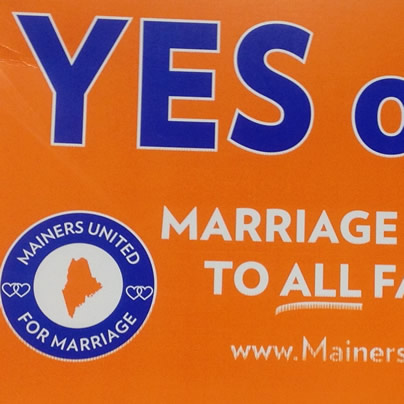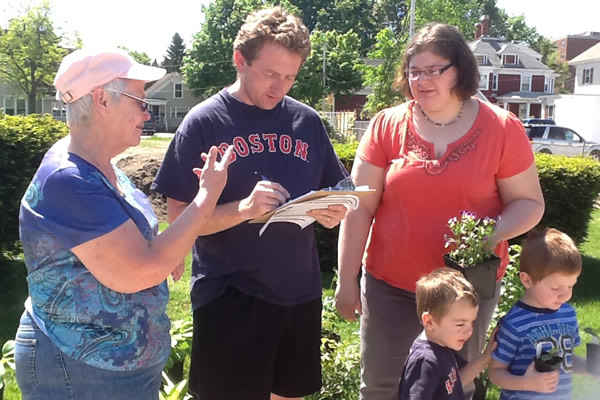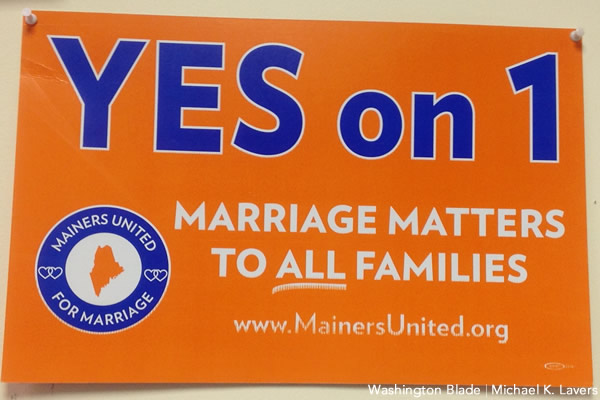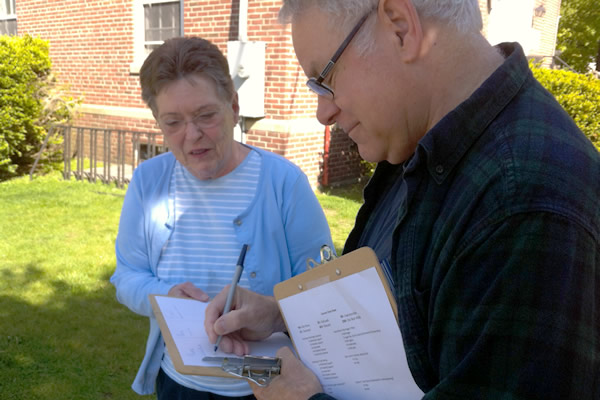National
Maine marriage campaign optimistic going into referendum
Polls indicate majority of voters would support ballot measure to allow same-sex marriage.


A Mainers United for Marriage volunteer speaks with likely voters in Sanford (Photo courtesy of Mainers United for Marriage)
SCARBOROUGH, Maine – Portland resident Ellen Ward never thought she would find herself speaking with fellow voters in support of marriage rights for same-sex couples.
The self-described introvert changed her mind, however, in 2009 when she listened to gays and lesbians and others testify in support of a same-sex marriage bill during a legislative hearing in Augusta, the state capital.
“They were leading very what most people call normal lives and just wanted to be able to affirm their love and commitment in the same way that other people got too,” Ward told the Washington Blade as she canvassed a suburban Portland neighborhood in the rain on Thursday afternoon. “And I was just really impressed with people standing up and testifying about that and churches testifying about that.”
Nearly three years after Maine voters repealed the state’s same-sex marriage law that then-Gov. John Baldacci signed, supporters of nuptials for gays and lesbians remain confident that a ballot question that would allow them to tie the knot will pass.
“What’s so unique about Maine is because we’re the first state to ever go on the offensive and bring the issue directly to the voters; we’ve been able to dictate our own timeline,” Matt McTighe, campaign manager of Mainers United for Marriage, the group supporting Question 1, told the Blade during an interview at his Portland office on Friday. “There was never a ticking clock. Every time this has come up before when it’s defensive it’s always in the current — something happens, a precipitating action, a court case, a legislative victory whatever. Our opponents then do something to undermine that or write something into the constitution or whatever. And now we’re on their turf. Now we’re playing defense on their side of the field.”
Voters in 2009 repealed the same-sex marriage law by a 53-47 percent margin. McTighe, a former Human Rights Campaign staffer who has worked on marriage efforts in Massachusetts and in other New England states for MassEquality and the Boston-based Gay and Lesbian Advocates and Defenders, described the 2012 campaign in Maine as a “night and day kind of difference” from that run ahead of the 2009 referendum.
“It’s always been designed from the ground up as a campaign for voters,” he said. “We didn’t have to worry about the legislature. We weren’t thinking about a court case or anything like that. Right from the beginning we’ve tried to figure out who are the voters we need to be talking to, let’s employ some of the most sophisticated modeling and tactics that have ever been applied to the marriage movement, let’s bring in the best people, the best consultants, the best field organizers, the best team and put together a plan and a model to figure out who we need to talk to.”
Voter: Same-sex marriage “doesn’t really affect me”
Maine is one of four states with either a same-sex marriage referendum or a constitutional amendment that would define marriage as between a man and a woman on the ballot next month. The Maine Freedom to Marry Coalition in January submitted more than 105,000 signatures to the Secretary of State in order to bring the issue before voters.

Polls indicate a majority of Maine voters would support a ballot measure to allow same-sex marriage. (Photo by Michael K. Lavers)
A Portland Press Herald poll conducted between Sept. 12-16 shows Question 1 leads by a 57-36 percent margin. A Public Policy Polling survey late last month indicates 52 percent of likely voters support the ballot measure, compared to 44 percent who oppose it and four percent who remain undecided.
Several Scarborough residents with whom Ward spoke said they would support Question 1.
“I’ll probably vote for it,” said one teenager who turns 18 on Nov. 1. He told Ward that he also works with a lesbian. “It doesn’t really affect me. I’m not really 100 percent for it, but I have nothing against it. Not to put it the wrong way but I really don’t care. Do whatever you want. If anything it’ll be better for the economy.”
A woman who lives on a nearby cul-de-sac told Ward that she plans to vote against the ballot question.
“I personally don’t have a problem with you getting together, but I’m not in favor of calling it marriage,” she said. “It’s a sacrament. To redefine marriage, I would vote no.”
Ward conceded the woman’s position against marriage rights for same-sex couples was “discouraging.” She did acknowledge, however, that she feels that her support of basic rights for gays and lesbians was encouraging.
“People have come a long way on that issue, certainly than even 20 years ago,” said Ward, who recalled a telephone conversation she had a couple of months ago with a 90-year-old woman who marched against racial segregation in the 1960s. She initially said she opposed nuptials for gays and lesbians, but Ward said she suddenly changed her mind when she realized the parallels between the civil rights and same-sex marriage movements. “I just feel there are so many people that we talk to these days who are completely supportive.”
Marriage remains “personal” for voters
Six Mainers United for Marriage ads continue to air on local television stations. These include one that features four generations of a family from the Downeast town of Machias and another that spotlights firefighters who support nuptials for gays and lesbians. Protect Marriage Maine, the group opposing Question 1, debuted their first two television ads on Monday.
“You have to make this about the voter themselves. You need to give them a personal reason to connect with the gay people that they know in their lives, to think about this issue in a way that they haven’t thought of before,” said McTighe, who is also a firefighter in the southern coastal Maine town of York. He applauded President Obama for supporting marriage rights for same-sex couples, but stressed the issue remains what he described as a deeply personal one for each potential voter. “You don’t just change your mind because somebody else did. You have to change your mind because somebody made it personal to you. Somebody showed you what is at stake. And also gave you an opportunity to have your questions and concerns addressed. That’s why the grassroots approach has been so unique, to be able to go out and have door-to-door with everyone in our persuadable universe, those people we identified early on.”
Mainers United for Marriage reported to the state Commission on Ethics and Election Practices late on Friday that it has raised slightly more than $3.35 million so far this year, compared with the $429,794.32 that Protect Marriage Maine has pulled in. McTighe told the Blade that he would like to raise another $750,000 to $1 million “to keep pace with” the amount of airtime that the National Organization for Marriage has reserved on the state’s television stations in the weeks leading up to Election Day.
“Now is sort of the crunch time,” he said. “We’ve been prepping for his. We’ve been planning for this so now we feel like we’re prepared for everything. When they come out with one attack, we’ve got plan A. When they come out with a different attack, we’ve got plan B. We can pull it as needed. We can execute as we need to, as long as we have the resources.”
McTighe said another challenge that the campaign faces of potential complacency.
“Because we are doing really well in the polls and because people are seeing all this great stuff and people love our TV ads and all this other stuff and we’re getting all this great earned media, it’s almost too easy for people to say, well they don’t need my help. They don’t me to volunteer. They don’t need me to donate. They don’t need me to write a check. They’ve got 57 percent in the polls. Well I don’t care as much now,” he said. “But the fact is we’ve never won before. Whether that 57 percent is solid or soft or who knows, we’ll see, but we’ve never won. Until we win, we should just assume that our opponents will dump whatever resources they need. We should just assume that they will stop at nothing. And we should assume that no lead is safe until we can actually win and hold one for just once, at least once. Then we can start saying okay well is a point where you’re safe. We’re just not there yet. We’re not there in any of the states.”
In spite of these potential hurdles, McTighe remains optimistic that Mainers United for Marriage will be able to successfully respond to Question 1 opponents’ ads and statements against nuptials for gays and lesbians during the final weeks of the campaign.
“We feel extremely well positioned to deal with anything they throw our way because we’ve had two and a half years to prepare for everything,” he said. “That is what’s so unique about Maine.”
Ward agreed.
“People have had a lot more chance to think about this,” she said, noting the passage of same-sex marriage laws in New York and other states since the 2009 vote. “It’s very much on people’s minds and people are talking about it now. It’s not so unheard of. I think people are just kind of more getting used to the idea and saying, oh, I have people in my family that this [impacts] or I have neighbors and I think they’re very nice people and wow, you know they want to get married. A lot of people had never thought of that before. I think part of it is people are getting used to the idea. And people who are already on board are saying of course, of course this matters. And more and more they want to see this happen. It just seems a no brainer to them.”
U.S. Supreme Court
Supreme Court to consider bans on trans athletes in school sports
27 states have passed laws limiting participation in athletics programs

The U.S. Supreme Court on Thursday agreed to hear two cases involving transgender youth challenging bans prohibiting them from participating in school sports.
In Little v. Hecox, plaintiffs represented by the ACLU, Legal Voice, and the law firm Cooley are challenging Idaho’s 2020 ban, which requires sex testing to adjudicate questions of an athlete’s eligibility.
The 9th U.S. Circuit Court of Appeals described the process in a 2023 decision halting the policy’s enforcement pending an outcome in the litigation. The “sex dispute verification process, whereby any individual can ‘dispute’ the sex of any female student athlete in the state of Idaho,” the court wrote, would “require her to undergo intrusive medical procedures to verify her sex, including gynecological exams.”
In West Virginia v. B.P.J., Lambda Legal, the ACLU, the ACLU of West Virginia, and Cooley are representing a trans middle school student challenging the Mountain State’s 2021 ban on trans athletes.
The plaintiff was participating in cross country when the law was passed, taking puberty blockers that would have significantly reduced the chances that she could have a physiological advantage over cisgender peers.
“Like any other educational program, school athletic programs should be accessible for everyone regardless of their sex or transgender status,” said Joshua Block, senior counsel for the ACLU’s LGBTQ and HIV Project. “Trans kids play sports for the same reasons their peers do — to learn perseverance, dedication, teamwork, and to simply have fun with their friends,” Block said.
He added, “Categorically excluding kids from school sports just because they are transgender will only make our schools less safe and more hurtful places for all youth. We believe the lower courts were right to block these discriminatory laws, and we will continue to defend the freedom of all kids to play.”
“Our client just wants to play sports with her friends and peers,” said Lambda Legal Senior Counsel Tara Borelli. “Everyone understands the value of participating in team athletics, for fitness, leadership, socialization, and myriad other benefits.”
Borelli continued, “The U.S. Court of Appeals for the Fourth Circuit last April issued a thoughtful and thorough ruling allowing B.P.J. to continue participating in track events. That well-reasoned decision should stand the test of time, and we stand ready to defend it.”
Shortly after taking control of both legislative chambers, Republican members of Congress tried — unsuccessfully — to pass a national ban like those now enforced in 27 states since 2020.
Federal Government
UPenn erases Lia Thomas’s records as part of settlement with White House
University agreed to ban trans women from women’s sports teams

In a settlement with the Trump-Vance administration announced on Tuesday, the University of Pennsylvania will ban transgender athletes from competing and erase swimming records set by transgender former student Lia Thomas.
The U.S. Department of Education’s Office for Civil Rights found the university in violation of Title IX, the federal rights law barring sex based discrimination in educational institutions, by “permitting males to compete in women’s intercollegiate athletics and to occupy women-only intimate facilities.”
The statement issued by University of Pennsylvania President J. Larry Jameson highlighted how the law’s interpretation was changed substantially under President Donald Trump’s second term.
“The Department of Education OCR investigated the participation of one transgender athlete on the women’s swimming team three years ago, during the 2021-2022 swim season,” he wrote. “At that time, Penn was in compliance with NCAA eligibility rules and Title IX as then interpreted.”
Jameson continued, “Penn has always followed — and continues to follow — Title IX and the applicable policy of the NCAA regarding transgender athletes. NCAA eligibility rules changed in February 2025 with Executive Orders 14168 and 14201 and Penn will continue to adhere to these new rules.”
Writing that “we acknowledge that some student-athletes were disadvantaged by these rules” in place while Thomas was allowed to compete, the university president added, “We recognize this and will apologize to those who experienced a competitive disadvantage or experienced anxiety because of the policies in effect at the time.”
“Today’s resolution agreement with UPenn is yet another example of the Trump effect in action,” Education Secretary Linda McMahon said in a statement. “Thanks to the leadership of President Trump, UPenn has agreed both to apologize for its past Title IX violations and to ensure that women’s sports are protected at the university for future generations of female athletes.”
Under former President Joe Biden, the department’s Office of Civil Rights sought to protect against anti-LGBTQ discrimination in education, bringing investigations and enforcement actions in cases where school officials might, for example, require trans students to use restrooms and facilities consistent with their birth sex or fail to respond to peer harassment over their gender identity.
Much of the legal reasoning behind the Biden-Harris administration’s positions extended from the 2020 U.S. Supreme Court case Bostock v. Clayton County, which found that sex-based discrimination includes that which is based on sexual orientation or gender identity under Title VII rules covering employment practices.
The Trump-Vance administration last week put the state of California on notice that its trans athlete policies were, or once were, in violation of Title IX, which comes amid the ongoing battle with Maine over the same issue.
New York
Two teens shot steps from Stonewall Inn after NYC Pride parade
One of the victims remains in critical condition

On Sunday night, following the annual NYC Pride March, two girls were shot in Sheridan Square, feet away from the historic Stonewall Inn.
According to an NYPD report, the two girls, aged 16 and 17, were shot around 10:15 p.m. as Pride festivities began to wind down. The 16-year-old was struck in the head and, according to police sources, is said to be in critical condition, while the 17-year-old was said to be in stable condition.
The Washington Blade confirmed with the NYPD the details from the police reports and learned no arrests had been made as of noon Monday.
The shooting took place in the Greenwich Village neighborhood of Manhattan, mere feet away from the most famous gay bar in the city — if not the world — the Stonewall Inn. Earlier that day, hundreds of thousands of people marched down Christopher Street to celebrate 55 years of LGBTQ people standing up for their rights.
In June 1969, after police raided the Stonewall Inn, members of the LGBTQ community pushed back, sparking what became known as the Stonewall riots. Over the course of two days, LGBTQ New Yorkers protested the discriminatory policing of queer spaces across the city and mobilized to speak out — and throw bottles if need be — at officers attempting to suppress their existence.
The following year, LGBTQ people returned to the Stonewall Inn and marched through the same streets where queer New Yorkers had been arrested, marking the first “Gay Pride March” in history and declaring that LGBTQ people were not going anywhere.
New York State Assemblywoman Deborah Glick, whose district includes Greenwich Village, took to social media to comment on the shooting.
“After decades of peaceful Pride celebrations — this year gun fire and two people shot near the Stonewall Inn is a reminder that gun violence is everywhere,” the lesbian lawmaker said on X. “Guns are a problem despite the NRA BS.”
-

 U.S. Supreme Court2 days ago
U.S. Supreme Court2 days agoSupreme Court to consider bans on trans athletes in school sports
-

 Out & About2 days ago
Out & About2 days agoCelebrate the Fourth of July the gay way!
-

 Virginia2 days ago
Virginia2 days agoVa. court allows conversion therapy despite law banning it
-

 Maryland4 days ago
Maryland4 days agoLGBTQ suicide prevention hotline option is going away. Here’s where else to go in Md.











